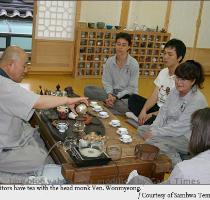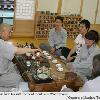Samhwasa on Mount Duta
Visitors thread 108 beads while doing the 108 prostrations By Jang Eun hwaContributing writerFollowing a refreshing breeze of early autumn we started for a temple about 200 kilometers east of Seoul Our destination was Samhwa Temple a branch temple for the Jogye Order s fourth District in Donghae Gangwon Province Today s team for an overnight temple stay is composed of five a French researcher in her late 20s and the rest in their late 40s or early 50s comprising a lawyer a company executive a publisher and a freelance writer Although we shared one thing in common namely the trip we were as much strangers to one another as our respective jobs Nevertheless we felt affinity for each other from the outset What made the five strangers feel familiar to each other The ``middle age to which the older four members belong is generally called ``chilgong palgong 70s and 80s generation in Korea They spent their university days under a dictatorship regime and often took part in student activism longing for establishing justice and democracy in the country The social atmosphere of those days was generally gloomy oppressed and frustrated while being frequently thrown into turmoil which contributed to forming a resistant critical counterculture of their own The more fundamental reason for the willingness to join together however is perhaps the sense of emptiness arising from inside I don t know whether the others will agree with me or not but it is apparent that we city dwellers almost always aspire for a calm retreat to escape from our routine secular affairs Samhwa Temple and Mt DutaSamhwa Temple is located on the lower part of Mt Duta one of the most beautiful scenic mountains in Korea Here the name Duta comes from the Sanskrit ``dhuta or the ascetic practice forsaking the attachment for food clothing and shelter Or alternatively it simply represents a dhuta practicing monk From Buddha s time there have been 12 categories of strict dhuta practices some of which are as




